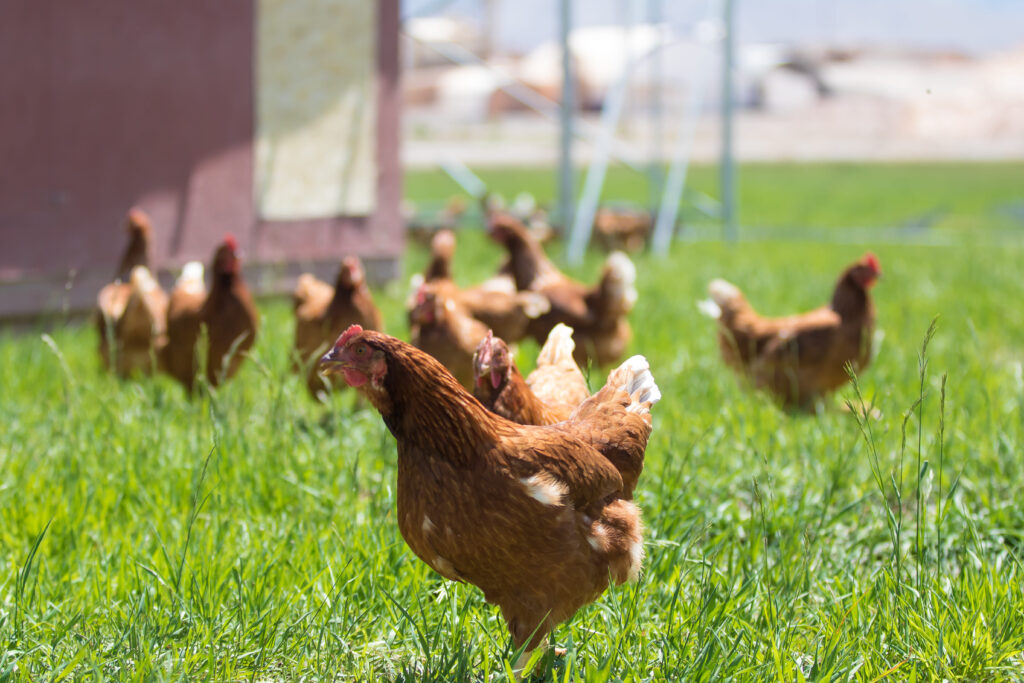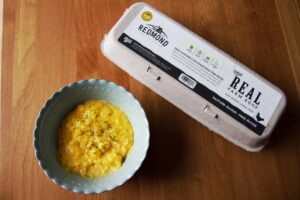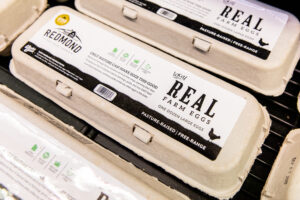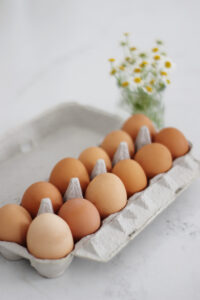Eggs are one of the most versatile and nutritious foods out there, and we at Redmond Farms work to provide you with the most nutrient-dense eggs possible.
But we couldn’t do what we do without our chickens!
We wanted to address a few eggs-ellent questions our customers have about our eggs and chickens, and give you a peek into this aspect of our sustainable farming.
Your Chicken Questions, Answered
Why has the color of the yolk changed?
If you’ve been a Redmond Heritage Farms customer for a while, you may have noticed that our egg yolks are lighter in color than they used to be. While the yolks used to be darker orange, these days, they’re a bright, sunny yellow.
This has concerned some of our customers because it’s commonly thought that darker yolks are more nutritious. This belief is further driven by the fact that most factory-farmed egg yolks are light yellow.
So, what happened to our yolks? The answer lies in the type of feed we used to use, and what we use now.
For a while, we fed our chickens an organic feed that contained marigold, which caused them to produce eggs with those dark orange yolks so many people want. The problem was, our hens lost almost all of their feathers and became very skinny. They were producing eggs but at the expense of their own health.
And as you know, the health of our animals comes first.
We’ve since switched to a different organic feed, sans marigold, and our chickens look so much better! They’re plump and healthy and have gorgeous feathers. Buuuut the yolks aren’t as dark as they used to be.
However, testing has determined that the nutrition content of our new eggs is very similar to the ones our hens laid with the marigold-containing feed.
Same nutrition and healthier chickens. We think that’s a good trade-off for a lighter yolk.
Does your chicken feed contain soy?
Nope! None of our farm animals, chickens included, consume any type of soy.
Our chickens eat organic, high-quality feed along with plenty of bugs they find themselves while pecking around outside. In other words, they eat a diet that’s natural to chickens, which allows them (and their eggs) to be as healthy as possible.
Why does the store run out of eggs in the winter?
Chickens naturally lay fewer eggs in the winter for two reasons:
First, the lack of sunlight affects their cycles. We can work with this a little bit by providing extra light (and we’re currently experimenting with different lights to provide light that’s as close as possible to sunlight to naturally increase production), but chickens will never lay as well in the winter as they will in the summer when the days are 16 hours long.
Secondly, in the cold weather, chickens’ little bodies divert more energy to warmth and less to egg-laying. This decreases production until the weather warms back up.
Are your chickens pastured?
Our chickens have plenty of room to run around in a netted-in outdoor area (we call it the chicken Taj Mahal), but they are not on a traditional grassy pasture.
Part of the reason for this is land limitations. In order to pasture chickens, they would have to share space with our cows. This could present a problem because there is a strain of avian TB that can be transferred from chickens to cows.
We regularly test our cows for TB, and while the avian strain won’t actually hurt the cows, it would still affect our ability to sell our milk, which throws a monkey wrench in our already fluctuating milk production.
So, we keep our species separated for now, and feed our hens a diet similar to what they’d consume if they were on grassy pasture.
On top of that, predators like foxes, skunks, coyotes, raccoons, and even the occasional cougar can present a problem in an open pasture. It’s not such a big deal for our cows, but a little chicken can be an easy snack for a critter. We’ll even bring our chickens inside from their netted Taj Mahal area if we notice a lot of predators around. Safety first!
For now, our chickens have several spacious buildings with lots of perches and nesting boxes for shelter, and plenty of room to run around, scratch, dust bathe, and be chickens in their netted outdoor area. Our chickens are never, ever caged, but we do lock the buildings at night to keep hungry predators out.
How many eggs do you produce in a year?
Egg production varies wildly from season to season, with about 250 eggs produced per day in the summer and around 10-20 produced per day in the winter.
We estimated that in 2022, our flock produced around 44,000 eggs. That’s enough to make an omelet the size of a basketball court!
How many chickens do you have?
At the time of this writing, our flock is made up of 350 hens.
Healthy Animals Come First
At the end of the day, we believe that healthy animals produce healthy food, and we practice what we preach. We put the health of our animals (and customers!) first, even if it means lower production or a less desirable egg yolk color.
Genuinely caring for the animals is a big part of sustainable farming, and is crucial for producing food that meets our high standards for quality.




